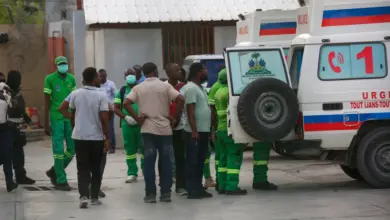
Anti-government protesters shut down Haiti’s capital on Monday as the country plunged deeper into political and economic crises even as many prepared for the annual Carnival, normally a time of peaceful revelry.
The usually congested streets of the capital were largely deserted after opposition parties and a minibus drivers’ union called a two-day general strike to protest high fuel prices.
Protest organizers warned residents to stay off the streets, saying those who ventured out would risk their lives.
Only minor incidents were reported. Police said they arrested 20 people and used tear gas to disperse a small group of university students.
In downtown Port-au-Prince young men played soccer on some streets, while barricades were erected in several suburbs to try to block motorcycle taxi drivers who did not observe the strike action.
One policeman was wounded by a stabbing in the Cité Soleil slum while trying to remove burning tires placed by strikers. Prime Minister Evans Paul called on state workers to show up for work but few did and most government offices in the capital were closed.
The impoverished Caribbean nation is in the midst of a political crisis after the previous prime minister was forced to resign in December and parliament was dissolved over the failure to hold municipal and legislative elections.
For three months, President Michel Martelly has faced radical government opponents calling for his removal, with students joining the protests last week.
Haiti’s government badly needs to raise cash from the sale of gasoline to pay off its mounting fuel debt with Venezuela’s preferential PetroCaribe program, which has ballooned to about US$1.5 billion.
The government “cannot lower the price of gas. It’s not that we do not want to, it’s because we are not able to,” Paul said in a statement.
“We are poor, we cannot live anymore,” said Loédon Gaspard, who drives a colorful pickup-turned-minibus, known locally as “tap-tap,” the Caribbean nation’s main form of public transport. “Gasoline prices are falling worldwide, so it should be the same here in Haiti,” he added.
After a one-day fuel strike last Monday, the government announced lower fuel prices, reducing gasoline to 195 gourdes ($4.25) per gallon from 215 gourdes ($4.62).
The US State Department and the United Nations peace-keeping force in Haiti have so far stood by Martelly, praising his efforts at compromise, and urging all sides to agree to hold the overdue elections.



